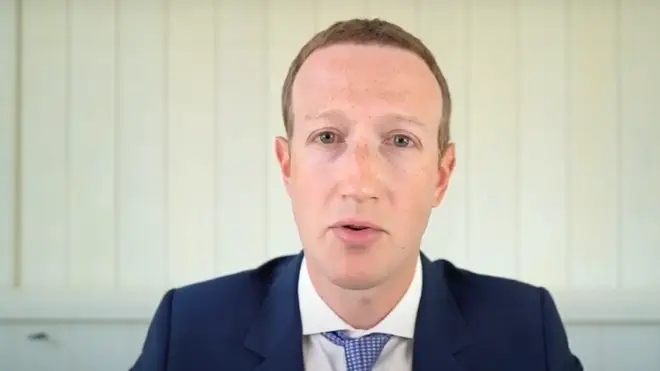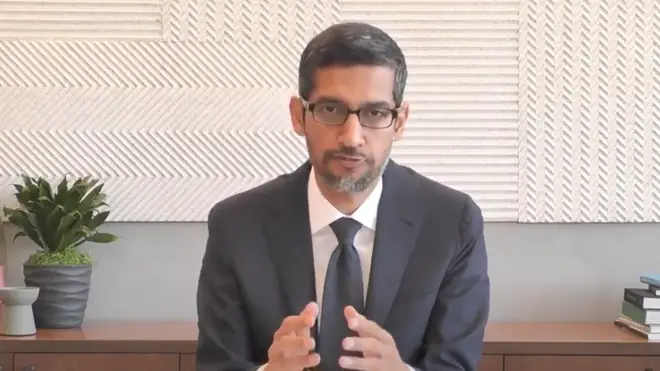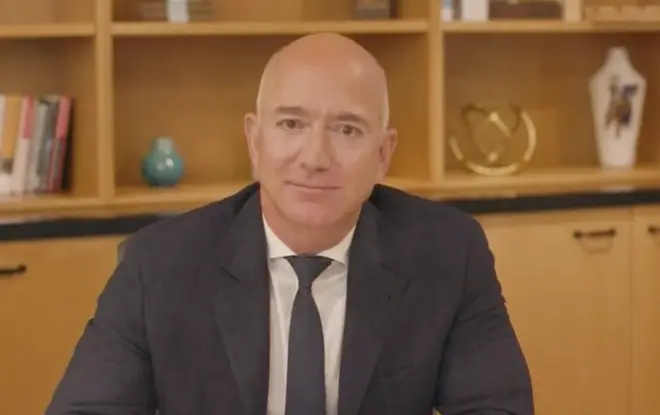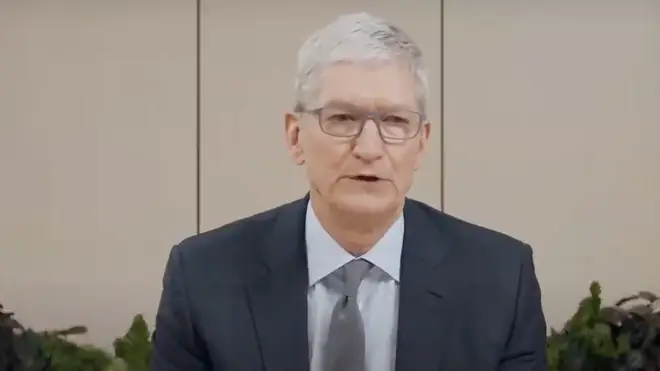
Iain Dale 10am - 1pm
29 July 2020, 21:10

Big tech CEOs testify on companies' practices
Mark Zuckerberg has said Facebook doesn't want to be "the arbiters of truth" as he appeared before Congress among other Big Tech bosses.
The Facebook founder, Apple's Tim Cook, Amazon's Jeff Bezos, and Google's Sundar Pichai are all being grilled by lawmakers as they seek to defend their firms against calls for "Big Tech" to be broken up.
It marks the first time they are testifying en-masse, and is the first time Mr Bezos has ever appeared in front of Congress.
All four CEOs have defended their companies, saying "Big Tech" spurs innovation - with Mr Bezos claiming the world "needs large firms".
The bosses sometimes struggled to answer questions about their business practices even as they provided data highlighting how competitive their markets are and the value of their innovation and essential services to consumers.

They also confronted a range of other concerns about alleged political bias, their effect on US democracy and their role in China.
Republican congressman Jim Sensenbrenner asked Mr Zuckerberg why a post by the US president's son, Donald Trump Jr, had been taken down because it discussed the efficacy of the drug hydroxychloroquine.
However, the post actually appeared on Twitter, but Mr Zuckerberg said he could detail his own company's policy on the subject.

"We do prohibit content that will lead to imminent risk of harm," he said.
"We do not want to become the arbiters of truth... [but] if someone is going to go out and say that hydroxychloroquine is proven to cure Covid, when in fact it has not been proven to cure Covid, and that statement could lead people to to take a drug that that in some cases, some of the data suggests that it might be harmful to people - we think that we should take that down."
"We are very focused on fighting against election interference ... also focused on fighting against hate speech.
"The goal is getting this stuff down before anyone sees it".
Read more: Donald Trump calls on Congress to 'bring fairness to Big Tech' ahead of hearing
He added: "Having fake and hateful content hurts our business. People do not want to see that stuff and they use are service less when they do. We are aligned with people in order to take that stuff down and we invest billions of dollars a year in doing so".
“Facebook proactively cooperates with the intelligence community to identify threats, often before they are identified by the intelligence community.”
Among the toughest questions for Google and Amazon involved accusations that they used their dominant platforms to scoop up data about competitors in a way that gave them an unfair advantage.
Mr Bezos said that he could not guarantee that Amazon had not accessed seller data to make competing products, an allegation that the company and its executives have previously denied.
Regulators in the US and Europe have scrutinised Amazon's relationship with the businesses that sell on its site and whether the online shopping giant has been using data from the sellers to create its own private-label products.
In his opening remarks, Committee chair David Cicilline explained that lawmakers are in the middle of a year-long investigation into patterns of abuse by online platforms.
He said: "The dominant platforms have wielded their power in destructive ways in order to expand."

He continued: "When the American people confronted monopolist in the past, via the railroads or the oil tycoons, or AT&T and Microsoft, we took action to ensure no private corporation controls our economy, or our democracy," he told the committee.
"We face similar challenges today.
"As gatekeepers of the digital economy these platforms enjoy the power to pick winners and losers to shake down small businesses and enrich themselves while choking off competitors.
"Their ability to dictate terms, call the shots, up-end entire sectors and inspire fear represent the powers of a private government.
"Our founders would not bow before a king, nor should we bow before the emperors of the online economy."
If Congress doesn’t bring fairness to Big Tech, which they should have done years ago, I will do it myself with Executive Orders. In Washington, it has been ALL TALK and NO ACTION for years, and the people of our Country are sick and tired of it!
— Donald J. Trump (@realDonaldTrump) July 29, 2020
Prior to today's hearing, US president Donald Trump tweeted a stark warning to his Congressional colleagues, telling them they need to "bring fairness to Big Tech" or he will "do it with an Executive order."
The President wrote: "If Congress doesn’t bring fairness to Big Tech, which they should have done years ago, I will do it myself with Executive Orders.
"In Washington, it has been ALL TALK and NO ACTION for years, and the people of our Country are sick and tired of it!"
The hearing comes amid a reft of criticism of tech companies, who are accused of using their size and power to benefit their own product and undercut rivals.
Many argue that these tactics depress competition and ultimately hurt the US economy.
Conservatives often accuse tech firms of suppressing conservative views on their sites and preventing free speech.
Republican Congressman Jim Jordan, of Ohio, said: "I'll just cut to the chase, big tech is out to get conservatives."
He also told the committee that Twitter is "censoring the president", despite Twitter CEO, Jack Dawsey, not being in attendance.
"Companies like Facebook, Google's YouTube and Twitter have become the public square of today, where political debate unfolds,” Mr Jordan said.
"But reports that dissenting views - often conservative views - are targeted or censored is seriously troubling.
"Conservatives are consumers too, and they need the protection of the antitrust laws.
"The power to influence debate carries with it remarkable responsibilities.
He continued: "Your companies are large, that's not a problem. Your companies are successful. That's not a problem either.
"But I want to leave here today with a more complete picture of how your individual companies use your size success and power, and what it means to the American consumer."
However, the companies pushed back against the argument during the hearing.
"Scrutiny is reasonable and appropriate," Apple boss Tim Cook said in prepared remarks.
"But we make no concession on the facts."
In his prepared remarks, Mr Bezos said his firm faced significant competition from firms such as Walmart.
"I love garage entrepreneurs—I was one. But, just like the world needs small companies, it also needs large ones. There are things small companies simply can't do," he said.

The chairman of the Congressional committee also accused Google of leveraging its dominant search engine to steal ideas and information from other websites and manipulating its results to drive people to its own digital services to boost its profits.
David Cicilline peppered Google CEO Sundar Pichai with the allegations of abusive behaviour.
Mr Pichai repeatedly deflected Mr Cicilline's attacks by asserting that Google tries to provide the most helpful and relevant information to the hundreds of millions of people who use its search engine each day.
He said this is part of its effort to keep them coming back instead of defecting to a rival service, such as Microsoft's Bing.
Mr Pichai struggled to answer one question about whether Google threatened to dump Yelp from its search engine database after the restaurant review site told Google to stop scraping its site for content.
Rep. Jim Sensenbrenner (R): Why did Facebook censor Donald Trump Jr?
— Aaron Rupar (@atrupar) July 29, 2020
ZUCKERBERG: That happened on Twitter, so hard for me to speak to that
🤦♂️🤦♂️🤦♂️🤦♂️🤦♂️🤦♂️ pic.twitter.com/EZ1LglsU4s
Later on in the hearing, Facebook founder Mark Zuckerberg was questioned about undercutting competition.
He responded by telling the hearing that Facebook is "not a dominant force in the industry".
"Facebook stands for a set of basic principles, giving people voice and economic opportunity, keeping people safe upholding democratic traditions like freedom of expression and voting and enabling an open and competitive marketplace," he commented.
"These are fundamental values for most of us, but not for everyone in the world, not for every company we compete with or the countries they represent.
"And as global competition increases. There is no guarantee that our values will win out."
He also pointed to the threat of China on US tech companies.
During the hearing it was also revealed that congress members had internal documents to deployed against Mark Zuckerberg by US politicians who claim that the company has taken over rivals in a bid to stifle competition.
Jerrold Nadler, the Democrat who heads the House Judiciary Committee, told Mr Zuckerberg at a hearing that documents obtained from the company "tell a very disturbing story" of Facebook's acquisition of the Instagram messaging service.
He said the documents show Mr Zuckerberg called Instagram a threat that could "meaningfully hurt" Facebook.
Mr Zuckerberg responded by saying that Facebook viewed Instagram as both a competitor and a "complement" to his firm's services, but also acknowledged that it competed with Facebook on photo-sharing.